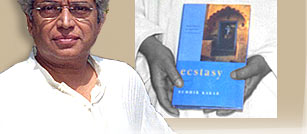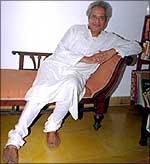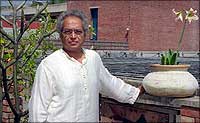The Rediff Special/Ashok Banker


Some people believe a good novel should do more than just tell a story. Some people feel a novel should educate even as it entertains. If you're such a person, you'll not regret picking up a copy of Sudhir Kakar's new novel Ecstasy (Viking Penguin India, Fiction, 251 pages, hardback, Rs 295)
Because Ecstasy, just like Kakar's debut work, The Ascetic Of Desire, is not a novel.
Let me explain.
The Ascetic of Desire was based on the life of Vatsyayana. In the course of narrating incidents from Vatsyayana's life, Kakar used the opportunity to explore the psyche of sexuality. He dealt not just with the life of the great sage, but also with the politics of man-woman relationships, analysed folklore and legends, explored the intellectual and physiognomic basis of sexual attraction and behaviour.
In short, he used the story as a means to an end. That end, clearly, was to write a book-length essay on sex and sexuality.
He did a wonderful job of it. The Ascetic of Desire was an intellectual delight. It stimulated the mind far more than the gonads. And that's a commendable achievement in an age where stimulating the gonads is the only goal of most writers, film-makers, television channels and advertisers.
It was a didactic novel, comparable to the didactic novels of earlier centuries, when the novel was seen as a medium to tell parables, allegories or moral tales. Except that Kakar's intention was not to offer religious insight, but simply to entertain the intellect instead of the imagination.
 To those who had read Kakar's work before, The Ascetic of Desire came as no surprise. After all, Kakar is a psychoanalyst by profession. He has authored several successful non-fiction books, taught at several leading universities in India, Europe and the United States. His books have been translated into several languages around the world.
To those who had read Kakar's work before, The Ascetic of Desire came as no surprise. After all, Kakar is a psychoanalyst by profession. He has authored several successful non-fiction books, taught at several leading universities in India, Europe and the United States. His books have been translated into several languages around the world.
It was only natural that his novel would carry his psychoanalysis a step further: It was almost as if he had placed Vatsyayana on his patient's couch and was rigorously psychoanalysing the man! It was, by and large, successful because sexuality is a complex topic well worth exploring and discussing. And psychoanalysis and sexuality have an inseparable bond, which can be traced back to that father of modern psychiatry, Sigmund Freud.
Freud may have been a little too glib for his own good, and extremely passionate, but misguided. Or so the revisionists now feel. But Kakar's exercise was a fascinating one because it enabled us to examine our own Indian history of sexual behaviour and attitudes in the light of modern psychoanalytical practice.
It was a great concept, brilliantly executed. An Ascetic of Desire is worth reading.
But the formula wears thin with Ecstasy. For one thing, the ecstasy in question here isn't sexual, but religious. Because, for his second novel, Kakar leaps several centuries ahead, selecting incidents from the life of Ramakrishna Paramhansa (1836-1886) as well as the life of Ramakrishna's chosen successor, Swami Vivekananda (1863-1902), which he uses as the basis for Ecstasy.
So far so good. Both are great men. Deserving of not one but any number of books discussing and illuminating their religious and spiritual views and thoughts. And a biography of either would be a wonderful idea. A biography of both would be too good to be true.
But Ecstasy is not a book-length essay on Ramakrishna and Vivekananda. Nor is it a biography. Nor is it a biographical novel.
 Starting out with a simple narrative, it tells the story of Gopal. Kakar clearly tells us in his note at the outset that Gopal's story is based on incidents taken from Ramakrishna's life. We see Gopal alias Ramakrishna experiencing his legendary visions, falling into religious trances, experiencing the fever-peak of spiritual enlightenment. Experiencing religious ecstasy, as the title promises.
Starting out with a simple narrative, it tells the story of Gopal. Kakar clearly tells us in his note at the outset that Gopal's story is based on incidents taken from Ramakrishna's life. We see Gopal alias Ramakrishna experiencing his legendary visions, falling into religious trances, experiencing the fever-peak of spiritual enlightenment. Experiencing religious ecstasy, as the title promises.
Kakar's prose is lucid and lyrical. He uses just the right language to describe such experiences without lapsing into melodramatic sentimentality or intellectual cynicism. He makes Gopal's experiences seem vivid and intensely believable. He makes us believe that Gopal believes he is experiencing these things. The novel is a short one and, within the first few pages, you are caught up in its simple net of narration, willing to travel through the life and times of this blessed young boy on the path of Godhead.
But soon we come across the first speed-breaker. The second section of the novel is titled Vivek and, in it, we jump forward to Gopal's grown-up years. He is now known as Ram Das Baba and considered a paramhansa, the most highly evolved of sadhus. Hence Ramakrishna's given title.
The problems begin with this section. Kakar has been telling us a fine story up to this point. The first part of a strong, well-realised, competently imagined childhood. But the minute he introduces Ram Das Baba, the Paramhansa, he instantly lapses into exactly the same religious sentimentalism we were dreading all this while.
The young boy Vivek and his friend Kamal's first encounters with Baba read more like extracts from missionary tracts than scenes from a novel. The didactic tone Baba takes, and Vivek's initial scepticism quickly giving way to fanatical admiration, are so weak that we're left feeling manipulated and boxed in.
Of course, we realise, these are real events. This is how the young Vivekananda first met and was impressed by the venerable Ramakrishna. These are probably the exact words and thoughts that Ramakrishna spoke.
If this was a religious non-fiction book relating the story of Ramakrishna and Vivekananda's lives, this might have been acceptable. After all, writers as accomplished as Iravati Karve have frankly represented portions of great epics anew. K M Munshi's Krishnavatara series is a wonderfully re-imagined and recreated version of the life of Krishna; in fact, he freely admits to having used his imagination where facts were not available. I N Birla's retelling of tales from Rajasthani folklore vary from the original tales at times, but read even better for these changes.
What Kakar himself did in The Ascetic of Desire was ingenious and acceptable. He added layers to the simple life of Vatsyayana. But, in Ecstasy, he seems unable to rise above the source material. Every time he narrates a scene or sequence where Ramakrishna's religious views or Vivekananda's thoughts are expressed, he seems undecided whether to let the lecture take centrestage or maintain the illusion of a fictional narration.
Even the Mahabharata and the Ramayana, two great examples of storytelling with deeply religious and didactic passages (the Gita being, one could argue, the greatest didactic passage of all), keep the story going relentlessly. The lessons, moral, religious, humane and otherwise, come through in the course of the telling rather than in chunks of expository speech.
Sadly, Kakar is unable to emulate any of his predecessors, let alone achieve anything remotely close to the great epics. After that superbly evocative opening, Ecstasy flounders from one lecture to another. Until, finally, by the time you reach the Epilogue and Vishnu Das congratulates Vivek on his decision to become a full-time worker in the RSS, you're inured to speeches like this one:
"This is what our country needs. Disciplined and dedicated young men forging a strong nation that does not ape the West. A male nation! No more of that irrational emotionalism which has sapped our energy over centuries. Your father would have been proud of you!"
 The following paragraphs outlining Vivek's progress in the RSS and the Sangh Parivar's hierarchy read almost like a pastiche of several real-life RSS figures. The final dream of despair he experiences is as thin and cardboard-like as the rest of the novel, unconvincing in its humanity and unfulfilled in its storytelling. You're not quite sure by this point if Kakar is criticising Vivek's decision or simply bemoaning the loss of his mentor and guru, Ramakrishna. Both, probably.
The following paragraphs outlining Vivek's progress in the RSS and the Sangh Parivar's hierarchy read almost like a pastiche of several real-life RSS figures. The final dream of despair he experiences is as thin and cardboard-like as the rest of the novel, unconvincing in its humanity and unfulfilled in its storytelling. You're not quite sure by this point if Kakar is criticising Vivek's decision or simply bemoaning the loss of his mentor and guru, Ramakrishna. Both, probably.
Sudhir Kakar the psychoanalyst is a fascinating writer. Sudhir Kakar the novelist is a gifted and readable writer. Even Sudhir Kakar the religious discurser might be worth reading if he were to choose to write such a book. But, in Ecstasy, he can't seem to decide if he is trying to recreate the stories of two great and influential historical figures or using the guise of their stories to dole out huge dollops of religious dogma.
In the end, it comes across as a mishmash of both. Which doesn't make for a good novel. Ecstasy doesn't arouse any ecstasy, divine or literary.
Photographs: Sondeep shankar/Saab Press
Design: Dominic Xavier
The Rediff Specials